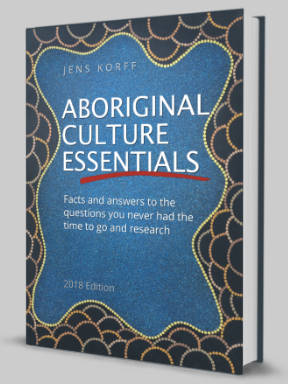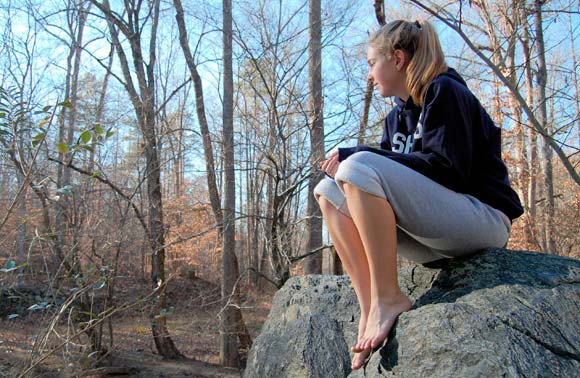Education
Deep listening (dadirri)
Aboriginal people practice deep listening, an almost spiritual skill, based on respect. Sometimes called 'dadirri', deep listening is inner, quiet, still awareness, waiting – and available to everyone.

Wishing you knew more about Aboriginal culture? Search no more.
Get key foundational knowledge about Aboriginal culture in a fun and engaging way.
This is no ordinary resource: It includes a fictional story, quizzes, crosswords and even a treasure hunt.
Stop feeling bad about not knowing. Make it fun to know better.
Deep listening explained

Aboriginal people passed on stories orally as they knew no writing. Listening to the story teller was vital to reproduce the story accurately to the next generation of story-tellers. Deep listening describes the processes of deep and respectful listening to build community—a way of encouraging people to explore and learn from the ancient heritage of Aboriginal culture, knowledge and understanding. [1]
A beautiful expression from Central Australia is "Can they bend the knees?" It inquires if you can sit down and truly listen, [2] a prerequisite for effectively absorbing information, but also an allusion to how information is passed on in that area: by sitting on the red earth.
Deep listening is also called dadirri, a word from the Ngan'gikurunggurr and Ngen'giwumirri languages of the Aboriginal people of the Daly River region, 220 kilometres south of Darwin, NT. All First Nations have their own word for meditation, deep listening, knowing and reflecting. For example, in the Wiradjuri language the word is Winhangadhurinya. [3]
[Dadirri] is in everyone. It is not just an Aboriginal thing.
— Miriam-Rose Ungunmerr-Baumann, Aboriginal writer [4]
Aboriginal writer and senior elder Miriam-Rose Ungunmerr-Baumann describes deep listening as follows: [5]
"Dadirri is inner, deep listening and quiet, still awareness. Dadirri recognises the deep spring that is inside us. We call on it and it calls to us. This is the gift that Australia is thirsting for. It is something like what you call 'contemplation'.
"When I experience dadirri, I am made whole again. I can sit on the riverbank or walk through the trees; even if someone close to me has passed away, I can find my peace in this silent awareness. There is no need of words. A big part of dadirri is listening."
"In our Aboriginal way, we learnt to listen from our earliest days. We could not live good and useful lives unless we listened. This was the normal way for us to learn – not by asking questions. We learnt by watching and listening, waiting and then acting."
"My people are not threatened by silence. They are completely at home in it. They have lived for thousands of years with Nature's quietness. My people today, recognise and experience in this quietness, the great Life-Giving Spirit, the Father of us all."
Dadirri also means awareness of where you've come from, why you are here, where are you going now and where you belong. It can be used as a tool to quieten the mind as it teaches about "the quiet stillness and the waiting," according to Ungunmerr-Baumann.
"Our Aboriginal culture has taught us to be still and to wait. We do not try to hurry things up. We let them follow their natural course – like the seasons."
Dadirri is also used as a prayer, a prayer in the sense of you just feel the presence of the Great Creator.
— Miriam-Rose Ungunmerr-Baumann, Aboriginal writer [4]
Dr Laura Brearley, author of the Deep Listening Book, says "deep listening is about tuning in... Deep listening is based on stories, silences and the spaces that lie between. As a research methodology, the practice of deep listening is an invitation into culturally congruent ways of learning and knowing." [1]
It does wonders for a person to just be still and listen to someone else talk about their life and how they probably came through things. You never know what you'll learn.
— Archie Roach, Aboriginal singer and songwriter [6]
Modern uses for deep listening
Deep listening is at the basis of some therapeutic methods used in counselling. [7]
Jennifer Thompson, founder of the Jenwakka Indigenous Counselling Service, describes deep listening as "tapping into her ancestors, constantly listening to spirits". "[Dadirri is] what non-Aboriginal people would call contemplation. It's the way we sit and take time and go in deep... The Dadirri is a way to take advantage of this [healing] knowledge. It requires people to stop, look, listen and learn." [7]
While the concepts of dadirri sound straight-forward and easy, the practice is harder than one might think.
Story: "I felt ashamed"
For dadirri to occur it doesn't need special arrangements, as this story from the 40th anniversary of the Aboriginal Tent Embassy shows: [8]
"An Elder from north of Cairns, relayed [a message] to a small crowd of us through a mobile phone held to the microphone of the public address system. A rambling, sometimes emotionally incoherent story of his family's and his mob's suffering.
"I was getting more and more frustrated, urging him inwardly to 'get to the point mate, get to the point'.
"I looked around me. Rapt attention. Some tears. I felt ashamed at my whitefella impatience."
I think (Dadirri) is a sense of being in the moment, of being aware of everything that's in that moment and I just find that really hard to do.
— Kerry Drever, high school teacher [9]
How you can experience dadirri
Deep listening is available to everyone. "Everybody has it," reveals Dr Miriam-Rose Ungunmerr-Baumann. "You have it. We all have it. It’s just that you haven’t been given the opportunity to discover it ... We can call on it and it calls to us. This is the gift that Australia is thirsting for." [10]
Exercise
Reserve a space regularly for about 5 minutes, in the morning or evening. Go outside if you can. Simply sit and look at and listen to the earth and environment that surrounds you.
Focus on something specific, such as a bird, a blade of grass, a clump of soil, cracked earth, a flower, bush or leaf, a cloud in the sky or a body of water, whatever you can see.
You can also let something find you, be it a leaf, the sound of a bird, the feel of the breeze, the light on a tree trunk. There's no need to try, just wait a while.
Be still and silent and listen.
Following this quiet time, there may be, on occasion, value in expressing in some way your experience of this quiet, still listening. You may wish to talk about the experience or journal, write poetry, draw, paint or sing. This needs to be held in balance - the key to dadirri is in simply being, rather than in outcomes and activity.
To experience dadirri first-hand, contact the Miriam Rose Foundation.
Go deeper: "Listening may be the golden key"
"In genuine listening we listen not just for what's being said, but for what's not being said," says William Ury, cofounder of Harvard’s Program on Negotiation, and one of the world’s best-known and most influential experts on negotiation. Watch this highly interesting talk Ury gave at TEDx SanDiego, peppered with many stories (15 minutes).